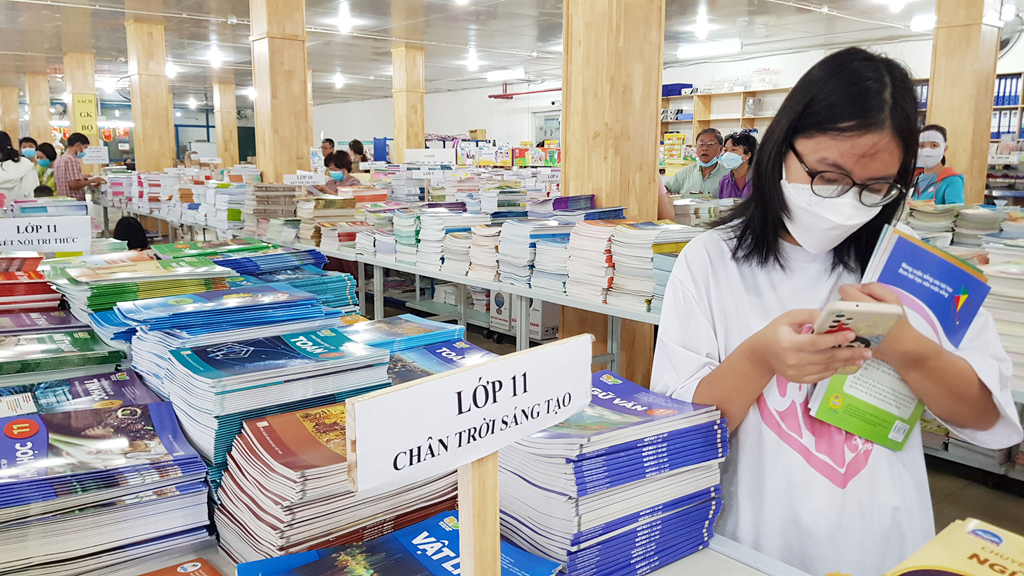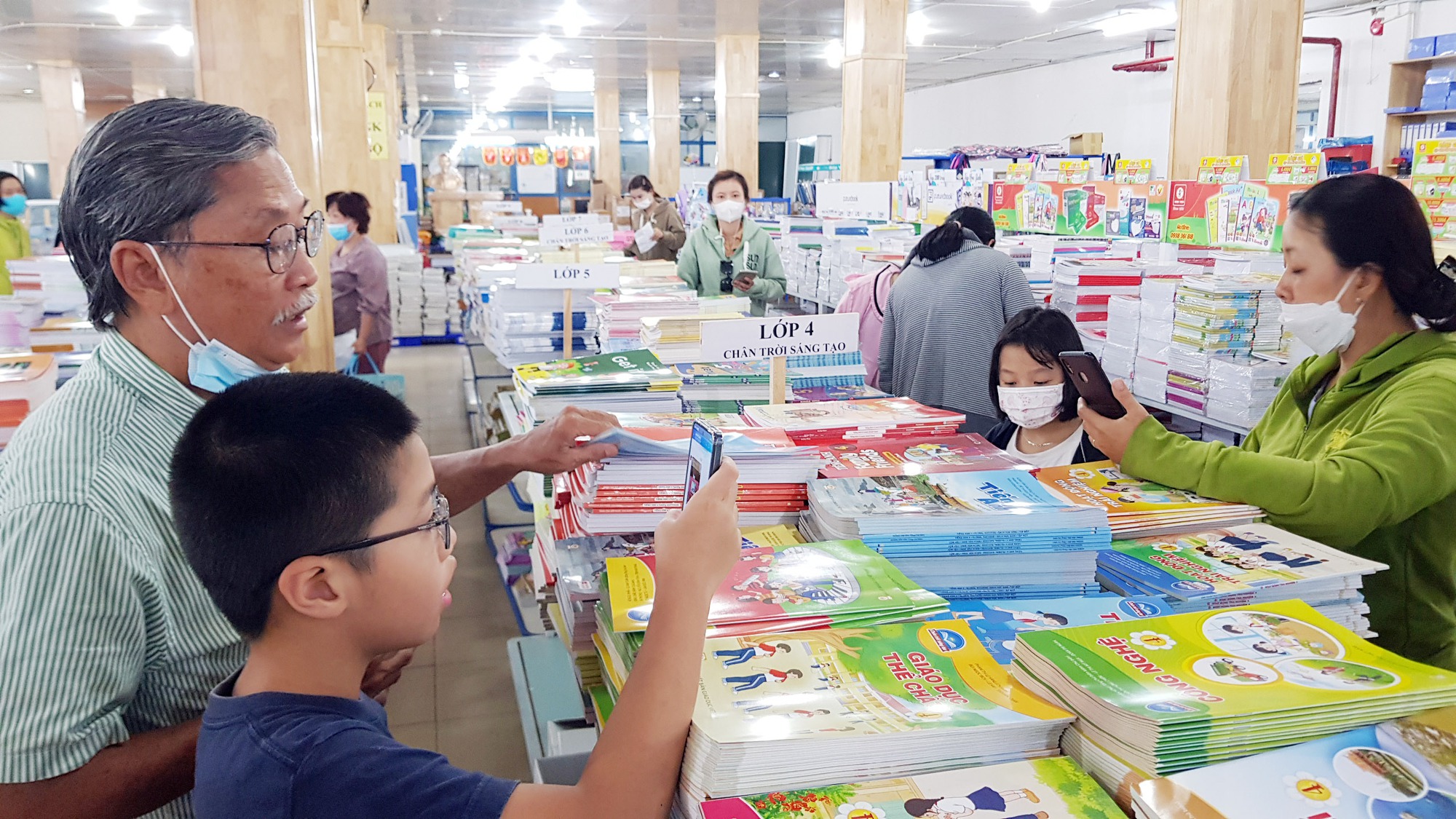However, after three years of this regulation being in effect, the selection of textbooks is still not truly the responsibility of the students and not for the benefit of the students.
" WILL TEXTBOOKS BE SHIFT FROM CENTRAL-LEVEL MONOPOLY TO LOCAL-LEVEL MONOPOLY?"
At a recent meeting between the National Assembly Standing Committee's supervisory delegation on curriculum and textbook reform and the Government, Representative Tran Van Lam, a member of the delegation, raised the issue of the current operation of multiple sets of textbooks: "We say the new curriculum is the law, and textbooks are only reference materials. So, have we thoroughly implemented the spirit of reform with multiple sets of textbooks? Can students attend class and study any textbook approved by the Ministry of Education and Training, or are they still dependent on the textbooks chosen by the school, and does teaching still rely on those textbooks?"
According to Representative Lam, the question is how committed the Ministry of Education and Training is to reform, or whether it will continue to use a single set of textbooks for each grade and each school. If this continues, many problems will arise in the textbook selection process, and the practice of "lobbying" for textbook choices will persist.
Associate Professor Vu Trong Ry, Vice President of the Vietnam Association of Psychological and Educational Sciences , believes that the selection of textbooks is a major obstacle when the decision is left to provincial People's Committees. "This regulation shifts the monopoly on textbooks from the central government (according to the old curriculum) to the local level," said Professor Ry, adding: "Teachers and students haven't truly had the choice of textbooks. We only focus on the difficulties in management without paying attention to the users."

Students are buying textbooks in preparation for the new school year.
Ms. Dao Thi Thuy, Principal of Doan Thi Diem Primary School ( Hanoi ), believes that if each class or school has many different types of students but only one set of textbooks, it can lead to misunderstandings about the curriculum and textbooks being the same. If people misunderstand the curriculum and textbooks as being like a legal decree, they may not dare to teach using the wrong textbook.
Many opinions also suggest that, ideally, innovation should reach a point where students can bring any textbook to class, as teachers would not be bound by any single textbook and would not be dependent on textbooks to develop their lessons.
The Ministry of Education and Training also acknowledged some limitations in the textbook selection process. These include the shift in perception regarding the autonomy of schools in developing and implementing educational plans; and the changing mindset of teachers, administrators, parents, and society regarding the role of textbooks—from using textbooks as the standard for teaching and assessment to teaching, assessment, and evaluation based on the content and learning objectives of the curriculum (textbooks only serving as the main teaching materials).
5% OF PROVINCES CHOOSE ONLY ONE SET OF TEXTBOOKS
Since the provincial People's Committees have been empowered to choose textbooks, there have been complaints every year about local authorities imposing their choices. The process involves submitting proposals, but whether those proposals are actually considered is another matter entirely.
A teacher in Quang Ngai said that the locality only chose one set of textbooks. The provincial textbook selection council said they chose based on the majority opinion. "However, we are moving towards differentiated instruction, paying attention to each student's needs, so textbooks chosen by a minority should also be valued because they are chosen because they find them suitable for their teaching conditions and student needs," this teacher said.
In Hanoi, since the regulation stipulating that provincial People's Committees decide on textbook selection was implemented, the city has continued to apply the most convenient method for schools: all textbooks approved by the Ministry of Education and Training can be used by schools in Hanoi for teaching. However, currently, no school allows students or parents to choose textbooks; instead, a list of textbooks selected by the school is provided, which parents can purchase themselves or register to have the school purchase them for them. Textbooks are also used uniformly at the school level, not according to grade level.

There are suggestions to consider empowering teachers, students, and parents to choose textbooks, instead of leaving the decision-making power to provincial People's Committees as is currently the case.
According to a report by the Ministry of Education and Training, in preparation for the new school year, approximately 41% of provinces have selected more than one set of textbooks for each subject; 54% of provinces have selected more than one set of textbooks for each subject; and 5% of provinces have selected only one set of textbooks for each subject...
Ms. Nguyen Thi Ha, a member of the 15th National Assembly, stated that textbook selection should be carried out with the spirit of ensuring suitability to the specific characteristics of regions, teachers, and students in educational institutions. Therefore, guidance from relevant authorities that respects the right of collective and individual users to choose textbooks is essential. However, Ms. Ha also said: "Measures are needed to manage textbook selection to avoid widespread and negative practices. In particular, strict guidance is needed on selecting members of the textbook selection council based on professional competence, qualifications, and ethical qualities. At the same time, serious action should be taken against negative phenomena related to textbooks. In addition, schools can socialize and add textbooks to their library's lending catalog to alleviate the financial burden on students from disadvantaged economic backgrounds."
Regulations regarding textbook selection will be revised.
Regarding textbook selection, the National Assembly Standing Committee's supervisory delegation on curriculum and textbook reform requested the Government to: "Evaluate the implementation of the policy of one curriculum, multiple textbooks; is it possible to simultaneously apply multiple sets of textbooks for each subject in the same educational institution? The necessity of amending regulations to standardize textbook selection and grant educational institutions the right to proactively choose textbooks, aiming to empower students, teachers, and parents to choose textbooks."
In a recent report from the monitoring delegation, the Minister of Education and Training stated that for each subject, teachers and students can use multiple sets of textbooks simultaneously. However, they must meet the requirements of the 2018 General Education Program. Textbooks with different approaches and using different learning materials make guiding students to learn simultaneously with content from multiple sources very difficult, requiring teachers with high pedagogical skills, students' self-discipline in learning, and class sizes that are not too large. "In the current circumstances, many general education institutions have not yet met these conditions," the head of the education sector remarked.
Regarding the consideration of empowering teachers, students, and parents to choose textbooks, the Government believes this is the "best and most appropriate way to implement democratic principles in the context of teaching and learning at general education institutions. The Government is directing the Ministry of Education and Training to research and amend Circular No. 25/2020/TT-BGDĐT on textbook selection in a way that strengthens the autonomous role of schools in choosing textbooks," the report to the monitoring delegation stated.
Opinion
While elementary school students are too young to choose textbooks, the role of parent representatives is also very important. Schools need to listen to parents' opinions, because they work daily with teachers to help and guide their children's self-study at home.
Ms. Nguyen Phuong Hoa (Principal of Vinh Tuy Primary School, Hai Ba Trung District, Hanoi)
Users should be the ones to choose because only they know what they need and what they lack. In reality, textbooks are no longer mandatory as they once were; they are now just reference materials, so there's no need for teachers and students to reach a consensus, and it's no longer necessary to seek the opinion of a higher-level council as is currently the case… Otherwise, there will still be cases where users are forced to use books they didn't choose.
Mr. Nguyen Tung Lam (Chairman of the Board of Directors of Dinh Tien Hoang High School, Hanoi)
A classroom with multiple textbooks chosen by each student is only feasible when teaching is completely independent of textbooks. However, currently, students are still required to have textbooks, and with multiple sets of textbooks, the knowledge structure of each book is designed differently. Therefore, it is difficult to imagine what teaching would be like if students were still required to have textbooks, and if they chose different textbooks within the same class.
A teacher from Ngo Si Lien Secondary School (Hoan Kiem District, Hanoi)
Source link










![[Photo] High-altitude schools proactively take measures to protect students from the cold.](https://vphoto.vietnam.vn/thumb/402x226/vietnam/resource/IMAGE/2026/01/08/1767883787301_a34-9332-jpg.webp)








































































































Comment (0)